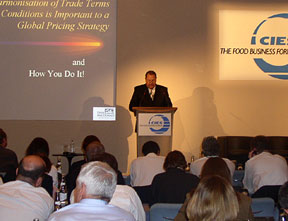|
WHY
HARMONISATION OF TRADE TERMS AND CONDITIONS IS IMPORTANT
TO A GLOBAL PRICING STRATEGY AND HOW YOU DO IT
Craig MacDonald, Managing Partner, Deeb MacDonald &
Associates, LLC., USA
Scope
of Global Pricing Strategy. The wide variations
in trade terms applied by manufacturers and retailers
in different regions have become more critical as retailing
has developed into a global sector. Addressing such
disparities is not straightforward since trade terms
are determined by a number of factors, such as logistics
and regulations. For global manufacturers, the ability
to establish local trade terms is essential to operate
effectively. However, to convince retailers that these
are within an acceptable range, they must have the "visibility"
to understand exactly which factors are involved and
how. 
Trade
Terms and Conditions. The complexity and inconsistency
of trade terms has been a source of both inefficiency
and conflict in the retail business. A manufacturer
may offer a retailer numerous incentives such as a 2%
rebate on the invoice for payment within seven days
or a bonus for a prominent position in the store. Intense
competition in local markets has seen such terms multiply,
with many broad "conditions" being changed
into obligatory terms.
Current
landscape. On the manufacturer side, some companies
have moved to harmonise their trade terms, some have
attempted to preserve local flexibility, while others
have ignored the issue. The simple fact is that the
problem will not go away and manufacturers will have
to invest in IT systems and training to address it.
Among retailers, frustration is growing at variations
in terms, with some operators demanding harmonisation.
In the short term, the situation will get worse, with
certain companies exploiting it and others losing out.
Influencing
factors. Four key factors will influence the issue
of terms in the future. Firstly, consolidation, which
will give rise to large groups seeking simplified rules
in order to support growth. Technology will help these
big players centralise data and eliminate disparities.
Secondly, governments will have a major bearing through
regulation but any impact should be clear and communicable
to consumers. Thirdly, the rise of common currencies
such as the dollar and the euro will make harmonisation
of terms simpler for companies. Finally, the pressure
to sustain growth and generate strong but transparent
financial results will make efficient trade practices
critical.
Why harmonise? For global manufacturers, the
main benefits are greater efficiency and competitiveness
vis-ˆ-vis local rivals. For retailers, there is the
prospect of greater consistency, visibility and simplification.
Both parties should also enjoy higher profits in the
context of a long-term relationship based on trust.
Although there are certain costs and risks involved
in changing approach, failure to move in this direction
could lead to a significant loss of business through
inefficiencies and a continued adversarial relationship
with partners.
Critical success factors for implementation. Both
manufacturers and retailers will require full support
internally on this issue, backed up by investment in
systems and training. To get the execution right, companies
will have to develop clear strategic goals if the changes
are to be followed through.
What
are the business benefits? In summary, manufacturers
should gain a competitive advantage from a simplified
business process and a long-term business relationship.
Retailers will enjoy a similar competitive edge, using
the simpler, more stable supplier relationship to support
expansion.
Q&A
Asked
how harmonisation of trade terms could be compatible
with a consumer-driven price strategy, Craig McDonald
emphasised that it was up to the retailer to set the
final price. However, manufacturers needed to be able
to explain a proposed buying price in relation to production
costs and trade terms. The aim is thus to establish
a clear and coherent price policy at the negotiations
stage, which can then be adapted according to specific
marketing needs. In practice, the retailer's use of
trade terms will depend significantly on the regulatory
environment, he added.
|

